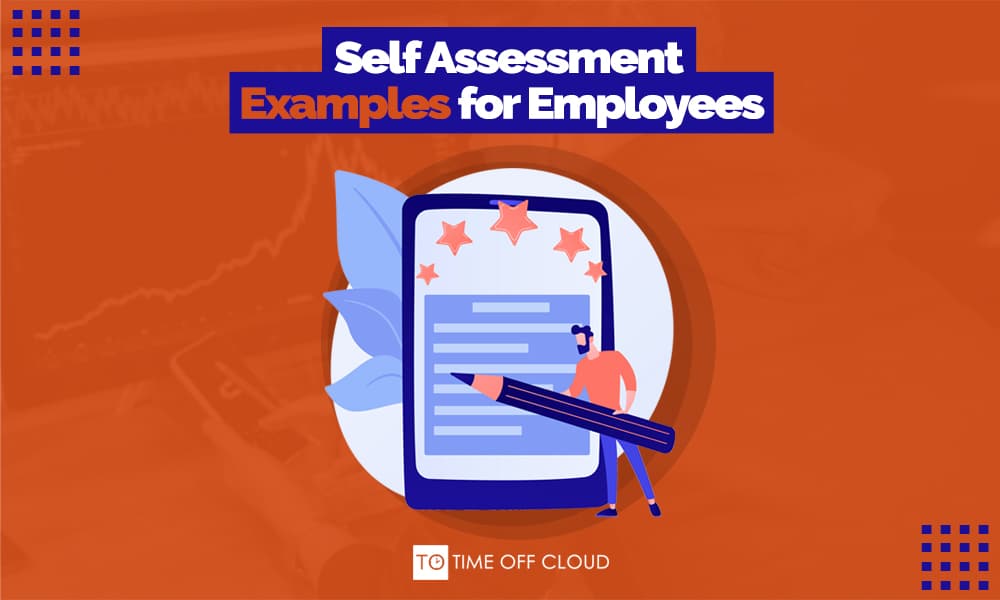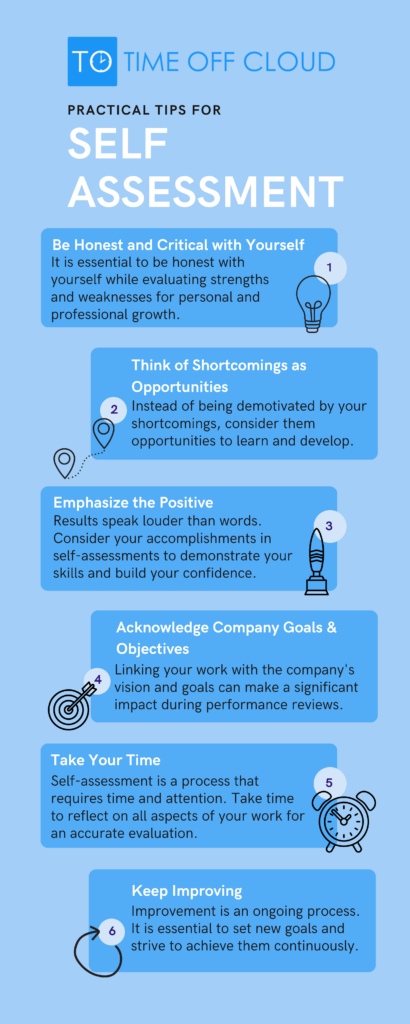Self assessment is essential for any worker, from managers to employees. It is a process that helps individuals understand themselves better, identify their strengths and weaknesses, and work towards improving their skills. In this article, we will explore the benefits of self assessment and provide practical tips and examples to help individuals with their assessment.
Self Assessment Statistics
Many companies are utilizing self assessment to improve performance and strengthen their workforces. In fact, according to a survey conducted by the Society for Human Resource Management (SHRM), 90% of companies in the United States use some form of employee self assessment as part of their performance management process. Another study published in the Journal of Occupational and Organizational Psychology found that self assessment can be an effective tool for improving job performance, particularly when employees receive feedback and support from their managers. This practice can be beneficial for companies in all industries.
Benefits of Self Assessment
Self assessment is a powerful tool that can help workers in many ways. Some of the benefits are:
- Know your strengths and weaknesses – Self assessment allows you to identify your areas of strength and weakness. This knowledge can help you focus on and address weaknesses and work towards improving. It will also help managers understand what training/resources they might need to provide for their workers to continue to grow.
- Learn from past achievements and failures – Self assessment helps workers reflect on their past achievements and failures. This reflection can help you identify mistakes and ensure you won’t repeat them in the future.
- Assist managers – Self assessment can provide HR managers with insights into how employees perceive themselves, their strengths, and areas they need to work on. It can also show management that you are a team player.
Practical Tips for Self Assessment
When assessing your job performance, try to keep the following in mind:
Review your job description and performance objectives: Start by reviewing your job description and performance objectives to understand what is expected of you. Assess how well you have been meeting these expectations and identify areas where you may have fallen short.
Reflect on your strengths and weaknesses: Think about your strengths and weaknesses in relation to your job responsibilities. What are you good at? What areas do you need to work on? Be honest with yourself and don’t be afraid to ask for feedback from colleagues or your supervisor.
Evaluate your accomplishments: Think about the accomplishments you have achieved over the past year. What projects did you complete successfully? What goals did you meet or exceed? Make note of these accomplishments and be prepared to discuss them during your performance review.
Identify areas for improvement: Based on your self-reflection, identify areas where you could improve. These could be specific skills or behaviors that you need to develop to perform your job more effectively. Set goals for yourself that will help you improve in these areas.
Plan for professional development: Identify ways to develop the skills you need to improve. This could include attending training sessions or workshops, reading industry publications, or seeking mentorship from a colleague.
Set goals: Based on your self assessment, set goals for yourself for the coming year. Make these goals specific, measurable, achievable, relevant, and time-bound (SMART) so that you can track your progress and hold yourself accountable.
Discuss your self assessment with your supervisor: Schedule a meeting with your supervisor to share your accomplishments, areas for improvement, and goals for the coming year. Ask for feedback on your self assessment and work with your supervisor to create a plan for your professional development.
Here are some quick practical tips for individuals to follow while evaluating themselves:
Self Assessment Example
Now that you’ve considered your job performance and determined your strengths and weaknesses, you’re ready to write a self assessment that benefits you and your employer. Consult the following template:
Introduction: My name is Jane Doe, and I am writing this self assessment as part of my annual performance review. Over the past year, I have worked as a marketing coordinator for XYZ Company, and I am grateful for the opportunity to reflect on my performance and identify areas for growth.
- Accomplishments:
- Successfully launched a new social media campaign that increased website traffic by 20%
- Managed the production of a new product video that received over 10,000 views on YouTube
- Coordinated a successful event that generated over 50 new leads for the sales team
- Strengths:
- Strong attention to detail, which has helped me catch errors and ensure accuracy in all of my work
- Excellent communication skills, which have allowed me to work effectively with colleagues across departments
- Expertise in social media marketing, which has helped me develop and execute successful campaigns
- Areas for improvement:
- Time management: I have sometimes struggled to prioritize tasks and meet deadlines, which has led to stress and rushed work
- Public speaking: I have had a few opportunities to present in front of colleagues or clients, but I still feel nervous and would like to improve my confidence and delivery
- Technical skills: I would like to learn more about graphic design software and HTML coding to be more versatile in my role
- Goals for the coming year:
- Complete a time management training program to help me better prioritize tasks and meet deadlines
- Volunteer to present at a team meeting to practice my public speaking skills
- Attend a graphic design workshop to improve my design skills and knowledge of software
Conclusion: Overall, I am proud of the work I have done over the past year and grateful for the support and guidance of my supervisor and colleagues. I look forward to continuing to grow as an employee and contribute to the success of XYZ Company.
Preparing for a Verbal Self Assessment
When it comes to verbal self assessments in the workplace, it’s important to be prepared, confident, and articulate. Here are some examples of things to consider ahead of a verbal self assessment:
Practice beforehand: Take some time to rehearse what you want to say and how you want to say it. Practice in front of a mirror or with a trusted friend or colleague. This will help you feel more confident and prepared.
Be specific: When discussing your accomplishments, be as specific as possible. Use data, examples, and anecdotes to illustrate your successes. This will help your supervisor or manager understand the impact of your work.
Use confident body language: Nonverbal communication is just as important as what you say. Use confident body language, such as maintaining eye contact, sitting up straight, and using gestures to emphasize your points. This will help you come across as confident and competent.
Be receptive to feedback: Remember that a self assessment is a two-way conversation. Be open to feedback from your supervisor or manager, and use this feedback to inform your goals for the coming year. Listen carefully to everything your manager has to say, and respond openly and clearly.
Follow up: After your verbal self assessment, be sure to follow up with your supervisor or manager to discuss next steps. This will demonstrate your commitment to your own development and help ensure that you stay on track to meet your goals.
Examples of Self Assessment Phrases
Here are some phrases that you can use while assessing yourself verbally:
- Problem Solving Skills – “I have proved my ability to solve problems with creative thinking.” / “I sometimes feel stressed out while encountering a sudden problem. That is the area I must work on to improve.”
- Communication Skills – “I communicate my ideas very well to my team.” / “I am not very good at sharing my thoughts with my team. I need to work hard on my communication skills.”
- Job Performance – “I have accomplished more than I was expected to.” / “I was not able to achieve the task I was assigned properly. This is the area I plan to work hard in the future.”
- Collaboration and Teamwork – “I am very collaborative with a team and work in harmony on our projects.” / “I am not an efficient member of a team. I want to improve this side of mine.”
In Conclusion
Self assessment is an important process for personal and professional growth. It is essential to be honest, critical, and reflective while evaluating yourself. By following the practical tips, implementing an efficient, modern time off tracking tool, and using the examples provided, you can assess yourself efficiently and work towards even more positive performance reviews.
Time Off Cloud as a Tool of Assessment
Time Off Cloud is a PTO tracking software tool that can help employees and managers keep track of their work. It can be an effective tool for self assessment and can provide managers insights into their employees’ performance. Schedule your free demo today.



